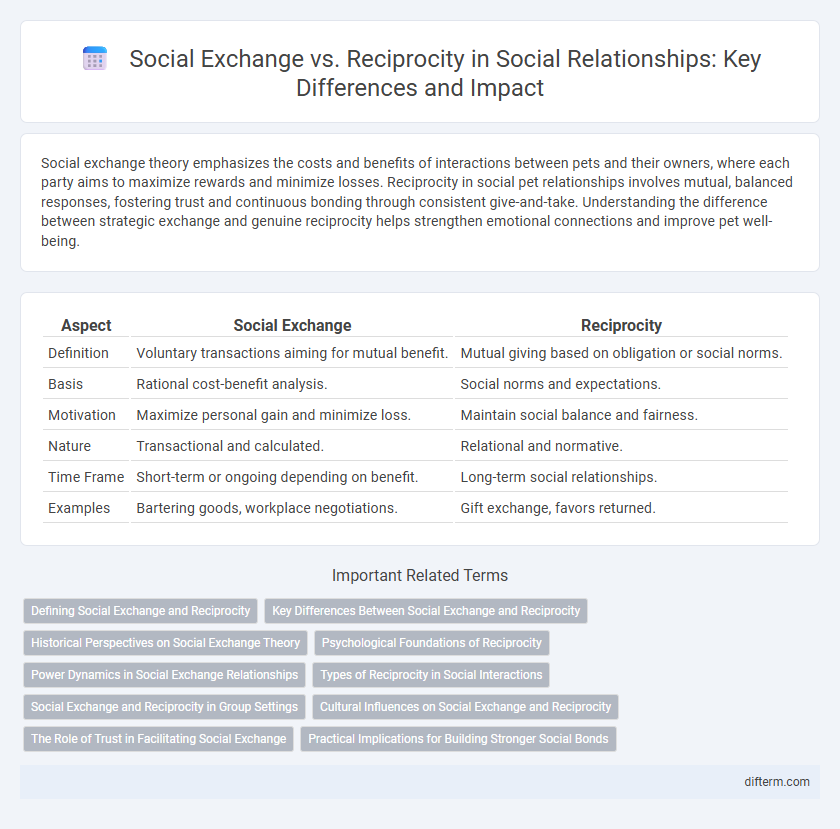Social exchange theory emphasizes the costs and benefits of interactions between pets and their owners, where each party aims to maximize rewards and minimize losses. Reciprocity in social pet relationships involves mutual, balanced responses, fostering trust and continuous bonding through consistent give-and-take. Understanding the difference between strategic exchange and genuine reciprocity helps strengthen emotional connections and improve pet well-being.
Table of Comparison
| Aspect | Social Exchange | Reciprocity |
|---|---|---|
| Definition | Voluntary transactions aiming for mutual benefit. | Mutual giving based on obligation or social norms. |
| Basis | Rational cost-benefit analysis. | Social norms and expectations. |
| Motivation | Maximize personal gain and minimize loss. | Maintain social balance and fairness. |
| Nature | Transactional and calculated. | Relational and normative. |
| Time Frame | Short-term or ongoing depending on benefit. | Long-term social relationships. |
| Examples | Bartering goods, workplace negotiations. | Gift exchange, favors returned. |
Defining Social Exchange and Reciprocity
Social exchange involves the mutual transfer of resources, services, or favors between individuals with the expectation of future returns, emphasizing calculated benefits and costs. Reciprocity refers to the social norm where a positive action is met with a corresponding positive response, reinforcing trust and cooperation within relationships. While social exchange is driven by rational evaluation, reciprocity is grounded in moral obligation and social bonding.
Key Differences Between Social Exchange and Reciprocity
Social exchange emphasizes a cost-benefit analysis where individuals seek to maximize rewards and minimize costs in interactions, involving explicit negotiations and expectations. Reciprocity centers on mutual giving and returning favors based on social norms, often operating through implicit obligations without immediate calculations. Key differences include the transactional nature of social exchange versus the norm-driven, often altruistic basis of reciprocity.
Historical Perspectives on Social Exchange Theory
Social Exchange Theory, developed in the mid-20th century, contrasts with traditional reciprocity by emphasizing calculated cost-benefit analyses in interpersonal interactions rather than mere mutual exchanges. Pioneers like George Homans and Peter Blau highlighted social exchange as a series of negotiated transactions influenced by individual expectations and societal norms. Historical perspectives reveal that this theory integrates psychological and economic principles, evolving beyond reciprocity to explain complex social behaviors through rewards and costs.
Psychological Foundations of Reciprocity
The psychological foundations of reciprocity center on the innate human drive to maintain social balance by returning favors, which strengthens trust and cooperation within groups. Social exchange theory frames reciprocity as a calculated outcome where individuals assess costs and benefits to maximize relational value. This dynamic underpins social cohesion by promoting mutual support and reinforcing expectations of equitable interaction.
Power Dynamics in Social Exchange Relationships
Power dynamics in social exchange relationships influence the balance of give-and-take, shaping how resources and support are distributed between parties. Unlike reciprocity, which emphasizes mutual obligation and equal exchange, social exchange theory highlights how individuals negotiate benefits and costs based on their relative power and dependence. The control over valued resources enables dominant actors to demand greater returns, reinforcing inequality and strategic interaction within social networks.
Types of Reciprocity in Social Interactions
Types of reciprocity in social interactions include generalized reciprocity, where favors are given without expecting immediate return, balanced reciprocity, involving direct exchanges of equivalent value, and negative reciprocity, which seeks to gain more than is given. Generalized reciprocity fosters long-term relationships and social trust by emphasizing mutual support, while balanced reciprocity maintains fairness and equality in transactions. Negative reciprocity can lead to conflict or exploitation, undermining cooperative social bonds.
Social Exchange and Reciprocity in Group Settings
Social exchange theory in group settings emphasizes the cost-benefit analysis individuals perform when engaging with others, where relationships are maintained based on anticipated rewards and mutual benefits. Reciprocity in these environments functions as a social norm, ensuring cooperation and trust by encouraging members to respond to positive actions with equivalent behaviors. Group dynamics are strengthened when social exchange is balanced with reciprocity, fostering cohesion and sustained social bonds.
Cultural Influences on Social Exchange and Reciprocity
Cultural influences play a crucial role in shaping social exchange and reciprocity by dictating the norms and expectations around giving and receiving within different societies. Collectivist cultures emphasize group harmony and long-term reciprocal relationships, often prioritizing mutual obligation over immediate exchange. In contrast, individualistic cultures typically promote explicit exchanges and fairness, valuing direct reciprocity and personal benefit in social interactions.
The Role of Trust in Facilitating Social Exchange
Trust acts as a crucial foundation in social exchange by reducing uncertainty and encouraging cooperative behavior between parties. It enables individuals to engage in reciprocal interactions with the confidence that their contributions will be fairly returned, fostering long-term relationships. High trust levels accelerate the exchange process and enhance social cohesion by minimizing the risk of exploitation.
Practical Implications for Building Stronger Social Bonds
Understanding social exchange emphasizes the balanced give-and-take in relationships, where tangible benefits are exchanged to maintain stability, while reciprocity centers on mutual trust and emotional obligation, fostering deeper connections. Prioritizing reciprocity in social interactions strengthens bonds by encouraging consistent acts of kindness and support that go beyond material expectations. Implementing strategies that value both social exchange principles and genuine reciprocity enhances cooperation, trust, and long-term relationship resilience.
social exchange vs reciprocity Infographic

 difterm.com
difterm.com